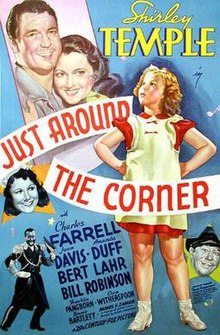
Laverne & Shirley is an American sitcom television series that ran for eight seasons on ABC from January 27, 1976, to May 10, 1983. A spin-off of Happy Days, Laverne & Shirley stars Penny Marshall and Cindy Williams as Laverne DeFazio and Shirley Feeney, two friends and roommates who work as bottle-cappers in the fictitious Shotz Brewery in late 1950s Milwaukee, Wisconsin. From the sixth season onwards, the series' setting changed to mid-1960s Burbank, California.

The Little Princess is a 1939 American drama film directed by Walter Lang. The screenplay by Ethel Hill and Walter Ferris is loosely based on the 1905 novel A Little Princess by Frances Hodgson Burnett. It was the first Shirley Temple movie to be filmed completely in Technicolor. It was also her last major success as a child star. This film was the third of three in which Shirley Temple and Cesar Romero appeared together, following Wee Willie Winkie (1937) and Ali Baba Goes to Town (1937).
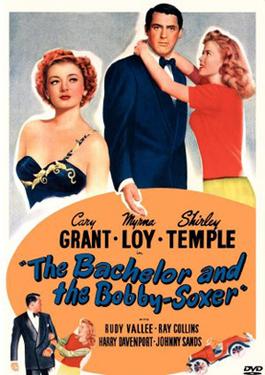
The Bachelor and the Bobby-Soxer is a 1947 American screwball romantic comedy-drama film directed by Irving Reis and written by Sidney Sheldon. The film stars Cary Grant, Myrna Loy and Shirley Temple in a story about a teenager's crush on an older man.

Rebecca of Sunnybrook Farm is a 1938 American musical comedy film directed by Allan Dwan, and written by Don Ettlinger, Karl Tunberg, Ben Markson and William M. Conselman, the third adaptation of Kate Douglas Wiggin's 1903 novel of the same name.

The Littlest Rebel is a 1935 American musical drama film directed by David Butler. The screenplay by Edwin J. Burke was adapted from a play of the same name by Edward Peple.
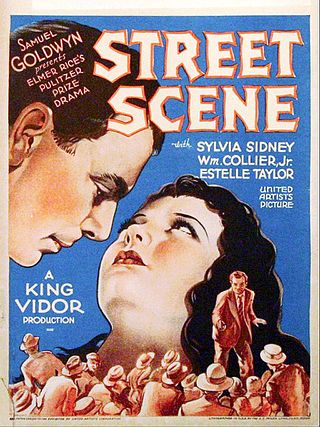
Street Scene is a 1931 American pre-Code drama film produced by Samuel Goldwyn and directed by King Vidor. With a screenplay by Elmer Rice adapted from his Pulitzer Prize-winning play of the same name, Street Scene takes place on a New York City street from one evening until the following afternoon. Except for one scene which takes place inside a taxi, Vidor shot the entire film on a single set depicting half a city block of house fronts.

Me, Natalie is a 1969 American comedy-drama film directed by Fred Coe about a young woman from Brooklyn who moves to Greenwich Village and finds romance with an aspiring artistic painter. The screenplay by A. Martin Zweiback is based on an original story by Stanley Shapiro. Patty Duke, who stars in the title role, won a Golden Globe Award for her performance. The film also features James Farentino, Salome Jens, Elsa Lanchester, Martin Balsam and Nancy Marchand. It marks Al Pacino's film debut.

Claude Benton Gillingwater was an American stage and screen actor. He first appeared on the stage then in more than 90 films between 1918 and 1939, including the Academy Award-nominated A Tale of Two Cities (1935) and Conquest (1937). He appeared in several films starring Shirley Temple, beginning with Poor Little Rich Girl (1936).

Stowaway is a 1936 American musical drama film directed by William A. Seiter. The screenplay by William M. Conselman, Nat Perrin, and Arthur Sheekman is based on a story by Samuel G. Engel. The film is about a young orphan called "Ching Ching" who meets wealthy playboy Tommy Randall in Shanghai and then accidentally stows away on the ocean liner he is travelling on. The film was hugely successful, and is available on videocassette and DVD.
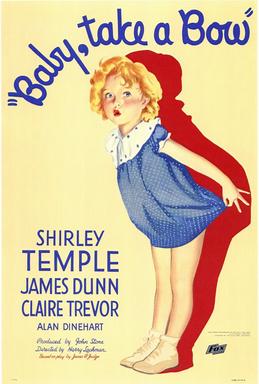
Baby Take a Bow is a 1934 American comedy-drama film directed by Harry Lachman and is one of the earliest Hays code Hollywood films. The screenplay by Philip Klein and Edward E. Paramore Jr. is based on the 1926 play Square Crooks by James P. Judge. Shirley Temple plays the child of an ex-convict trying to make a better life for himself and his family. The film was a commercial success and is critically regarded as pleasant and sentimental. A musical number features Dunn and Temple.
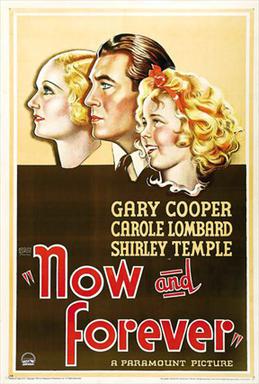
Now and Forever is a 1934 American drama film directed by Henry Hathaway. The screenplay by Vincent Lawrence and Sylvia Thalberg was based on the story "Honor Bright" by Jack Kirkland and Melville Baker. The film stars Gary Cooper, Carole Lombard, and Shirley Temple in a story about a small-time swindler going straight for his child's sake. Temple sang "The World Owes Me a Living," introducing the future standard. The film was critically well received. Temple adored Cooper, who nicknamed her 'Wigglebritches'. This is the only film in which Lombard and Temple appeared together.

Junior Miss is a 1945 American comedy film starring Peggy Ann Garner as a teenager who meddles in people's love lives.
The Mitchell family is a fictional family in the UK soap opera EastEnders. They were first introduced in February 1990, when brothers Phil and Grant Mitchell bought the local garage, the Arches. Their sister Sam was introduced later in 1990, and their mother Peggy shortly after in 1991, before being reintroduced as a regular character in 1994, with the role recast to Barbara Windsor. Since then, the family has been significantly expanded to include both the immediate and extended families. Phil has been the longest running Mitchell on the show, and the family has expanded significantly in the years since, remaining a large presence on the square.
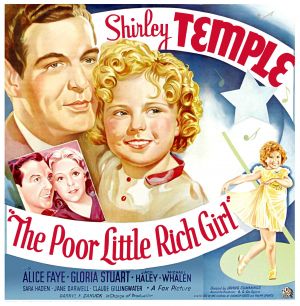
Poor Little Rich Girl, advertised as The Poor Little Rich Girl, is a 1936 American musical film directed by Irving Cummings and starring Shirley Temple, Alice Faye and Jack Haley. The screenplay by Sam Hellman, Gladys Lehman, and Harry Tugend was based on stories by Eleanor Gates and Ralph Spence, and the 1917 Mary Pickford vehicle of the same name. The film focuses on a child (Temple) neglected by her rich and busy father. She meets two vaudeville performers and becomes a radio singing star. The film received a lukewarm critical reception from The New York Times.
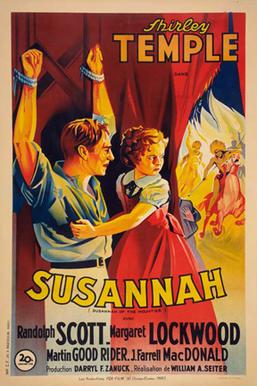
Susannah of the Mounties is a 1939 American Western film directed by William A. Seiter and starring Shirley Temple, Randolph Scott, and Margaret Lockwood. Based on the 1936 novel Susannah of the Mounties by Muriel Denison, the film is about an orphaned survivor of an Indian attack in the Canadian West who is taken in by a Mountie and his girlfriend. Following additional Indian attacks, the Mountie is saved from the stake by the young girl's intervention with the Indian chief.
"Home Economics" is the eighth episode of the first season of the American comedy television series Community. It aired in the United States on NBC on November 5, 2009. The episode revolves around Jeff's living situation now that he no longer has the money he earned as a big-shot lawyer and the emotional aftermath of Britta and Vaughn's breakup. It garnered 5.45 million viewers on its premiere and received positive critical reception.
"Custody Law and Eastern European Diplomacy" is the eighteenth episode of the second season of the American comedy television series Community, and the 43rd episode of the series overall. It aired in the United States on NBC on March 17, 2011. The episode focuses on Shirley's pregnancy, while Abed and Troy make friends with a student from the Balkans.
"Studies in Modern Movement" is the seventh episode of the third season and 56th overall episode of the American sitcom Community. It was originally broadcast on November 10, 2011, on NBC.
"Foosball and Nocturnal Vigilantism" is the ninth episode of the third season of the American television sitcom Community. It originally aired on December 1, 2011, on NBC.
"Cooperative Escapism in Familial Relations" is the 5th episode of the fourth season and 76th overall episode of Community, which originally aired on March 7, 2013 on NBC. Set at Thanksgiving, the episode shows Jeff meeting his father for the first time while other members of the group attend Shirley's Thanksgiving dinner with her family, in a parody of The Shawshank Redemption. The former storyline received mixed critical reception, whilst the latter was mostly criticized. The episode was watched by an estimated 3.29 million viewers upon its premiere.
